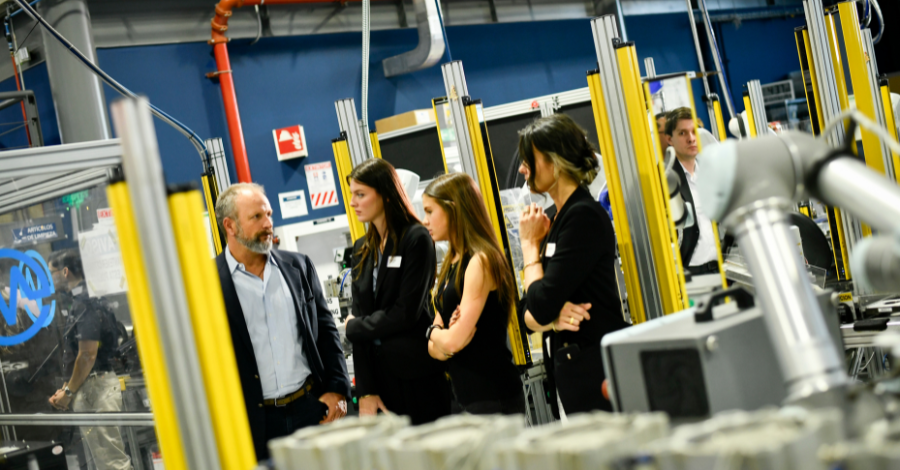NEWS
Investment Monitor: "Homeward bound, Costa Rica responds to nearshoring trends"
*Article originally published at https://bit.ly/2XZh1Pm / Partner content from CINDE
Business and agency leaders discuss why Costa Rica is a prime location for investors re-examining their site selection options as they seek to shorten and strengthen supply chains post-Covid-19.
In December 2020, Intel made a striking announcement. Over the next three years, the tech giant will invest $350m to restart assembly and testing of microchips in Costa Rica.
Despite retaining a strong presence in the country, Intel closed its Costa Rican chip assembly plant in 2014, after 17 years of operations. Assembly and testing were then split between existing sites in Malaysia, Vietnam and China. So, Intel’s announcement marks a homecoming of sorts, but might it also reflect wider thinking among multinationals around the consolidation of supply chains and the benefits of nearshoring?
The news was welcomed by the country’s president, Carlos Alvarado. “This is an especially powerful sign that, in the midst of the coronavirus pandemic, Costa Rica has strengthened its reputation for being a reliable destination for foreign direct investment,” he said.
“Investment of this magnitude deepens the Intel footprint in the country and opens up significant employment opportunities for people of different educational and skill levels.”
Intel first invested in Costa Rica more than two decades ago. The new testing and operations plant will form part of the company’s manufacturing and operations division. Finished silicon wafers will arrive here to be separated into individual microchips, packaged and finally tested for functionality. This highly complex product will go on to power millions of computing devices around the world.
Located in San Antonio de Belén, the facility joins Intel’s existing high-value R&D centre – the largest in Costa Rica – and its Global Services Centre, responsible for designing and optimising business processes across the company’s finance, human resources, sales and marketing departments.
Upon the announcement, general manager of Intel Costa Rica Ileana Rojas explained: “The existing infrastructure, synergy with the test operations that already exist on-site, the talent, the free trade zone regime and legal environment gave Intel a favourable option to start its assembly capacity in Cost Rica.”
Reaching new heights
Intel’s decision is just the latest example in a long line of international businesses looking to grow and diversify their operations in Costa Rica. Despite the pandemic, multinationals in the country generated a total of 19,806 new jobs last year – an 18.4% year-on-year increase. The Costa Rican Investment Promotion Agency (CINDE) reported a record 81 confirmed projects during 2020, 26 of which are new companies headquartered in a range of countries, from Germany to Japan.
Within days of Intel’s announcement in December, MicroVention-Terumo – a US-Japanese company in the life sciences sector – revealed plans to invest nearly $80m by 2022 with the construction of a new 20,000m² facility in Alajuela.
MicroVention-Terumo already manages two additional plants in the area that manufacture specialist medical devices used in endovascular therapies. This new investment will create 2,000 jobs.
“Our success in Costa Rica has grown MicroVention into what is now our third expansion in the country,” says the company’s vice-president of international operations, Charlie Noel. “We are very proud of shipping Costa Rica-made products to doctors around the world, thus helping our patients to have a better quality of life.”
Exploring the case for nearshoring
In recent years growing trade tensions between the US and China, coupled with rising labour costs in Asia, have brought renewed focus on to the benefits of nearshoring.
The outbreak of Covid-19 only bolstered the argument, as vulnerabilities in the global supply chain were painfully exposed and countries around the world faced shortages of the critical equipment needed to fight the pandemic.
The World Economic Forum has advised business leaders to “aggressively evaluate nearshore options to shorten supply chains and increase proximity to customers”.
A McKinsey & Company survey conducted only a few months into the pandemic revealed that 93% of supply chain executives already planned to take steps to make their supply chains more resilient, including nearshoring, building in redundancy across suppliers and regionalising their supply chains.
Costa Rica: set for a nearshoring boom?
In August 2020, the Economist Intelligence Unit (EIU) released a report highlighting the “lucrative opportunities” that disruptions to the global supply chain due to Covid-19 present for Latin America. According to the EIU, the region has the potential to make considerable gains from nearshoring over the next decade.
Costa Rica’s political stability, geographic proximity to the US, Canada and Europe, highly skilled workforce and competitive tax incentives in its economic free zones put the country in a particularly strong position to exploit the growing interest in nearshoring.
For Jorge Sequeira, CINDE’s managing director, the pandemic has reaffirmed Costa Rica as a pre-eminent location for nearshoring.
“The results we had in 2020 reflect a high level of trust by multinationals in our country, where we were able to demonstrate a strong response, resilience and reinvention of businesses but more so, to demonstrate our people’s capacity,” he says.
Within days of the first lockdown, 98% of the country’s services sector employees were working from home, while manufacturing companies quickly identified critical on-site jobs and put measures in place to enable them to continue operating smoothly.
CINDE’s positive investment results reinforce Costa Rica’s sustained contribution to the UN’s global Sustainable Development Goals (SDGs), with a special focus on quality education, innovation and infrastructure, decent work and gender equality.
“Costa Rica’s commitment to sustainability is our flagship to develop the right conditions for multinational companies that are looking to invest with purpose,” explains Sequeira. “Under the ‘People, Planet, Prosperity’ pillars, we are boosting the opportunities for all those responsible enterprises that need a strategic partner to accomplish new business standards and need their SDGs to impact the triple bottom line.”
As companies look for ways to increase the resiliency of their supply chains post-Covid-19, interest in nearshoring opportunities will continue to grow. Against the odds, it has been a record-breaking year for foreign investment in Costa Rica and the slew of multinationals opting to establish or expand operations in the country shows few signs of slowing down.
This thriving business landscape, combined with a highly skilled, experienced and multilingual workforce, marks Costa Rica out as a destination of choice for multinationals looking to bring business closer to home.
Interested in reading more about Costa Rica?








